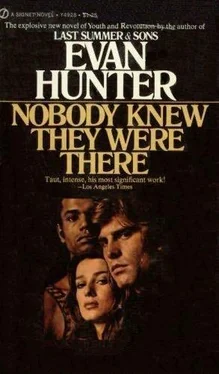Evan Hunter - Nobody Knew They Were There
Здесь есть возможность читать онлайн «Evan Hunter - Nobody Knew They Were There» весь текст электронной книги совершенно бесплатно (целиком полную версию без сокращений). В некоторых случаях можно слушать аудио, скачать через торрент в формате fb2 и присутствует краткое содержание. Город: New York, Год выпуска: 1971, ISBN: 1971, Издательство: Doubleday & Company, Жанр: Проза, на английском языке. Описание произведения, (предисловие) а так же отзывы посетителей доступны на портале библиотеки ЛибКат.
- Название:Nobody Knew They Were There
- Автор:
- Издательство:Doubleday & Company
- Жанр:
- Год:1971
- Город:New York
- ISBN:978-0094575004
- Рейтинг книги:4 / 5. Голосов: 1
-
Избранное:Добавить в избранное
- Отзывы:
-
Ваша оценка:
- 80
- 1
- 2
- 3
- 4
- 5
Nobody Knew They Were There: краткое содержание, описание и аннотация
Предлагаем к чтению аннотацию, описание, краткое содержание или предисловие (зависит от того, что написал сам автор книги «Nobody Knew They Were There»). Если вы не нашли необходимую информацию о книге — напишите в комментариях, мы постараемся отыскать её.
Nobody Knew They Were There — читать онлайн бесплатно полную книгу (весь текст) целиком
Ниже представлен текст книги, разбитый по страницам. Система сохранения места последней прочитанной страницы, позволяет с удобством читать онлайн бесплатно книгу «Nobody Knew They Were There», без необходимости каждый раз заново искать на чём Вы остановились. Поставьте закладку, и сможете в любой момент перейти на страницу, на которой закончили чтение.
Интервал:
Закладка:
From a booth in the corner drugstore, I try Weglowski’s number. The phone is answered by a woman who can barely speak English. She asks me to wait, and then a young girl's voice comes onto the line.
“Yes?” she says.
“Who’s this, please?”
“This is Emilia. Who did you want?”
“Mr. Weglowski.”
“I’m sorry, my father’s out right now.”
“When do you expect him back?”
“I don’t know.”
“Would you ask him to call me, please? When he gets in?”
“All right, what’s your name?”
“Arthur Sachs.”
“Just a minute.” She puts down the receiver. I hear her clattering around, presumably searching for a pencil. “All right,” she says.
“Arthur Sachs,” I tell her again, “s-a-c-h-s.”
“And the number?”
“He has it”
“I’ll tell him you called.”
“Thank you,” I say, and hang up. I sit in the booth for several moments, wondering where the old man can be. I want to tell him that there are now agents in town, that we must now postpone the wiring of the bridge until the last possible moment. I wonder if Emilia is the girl who will be twenty years old tomorrow. I wonder if Weglowski will recognize the urgency of the situation and agree to forego her party. Tomorrow is Halloween, it is not safe to wire a bridge on a night when goblins and federal agents are abroad. I wonder if Weglowski is superstitious. I am wondering too many things. I take another dime from my pocket and dial Hester’s number. The telephone is answered on the third ring.
“Miss Pratt’s residence.” (Fanny Hollis, mother of Davey, my follower, who incidentally caused a slight commotion on campus last spring, and who has now incidentally brought federal agents to town looking for him in advance of the train’s arrival.)
“May I speak to Miss Pratt, please?”
“Who's calling?”
“Arthur Sachs.”
“One moment”
I wait. When Hester’s voice comes onto the line at last, it contains all of its customary warmth and good humor. “Yes, Mr. Sachs, what is it?” Good old Hester. The one constant in a variable universe.
“There are federal agents in town. They’re asking about David Hollis.”
“Where are you?” Hester asks immediately.
“In a phone booth, don’t worry. Do you know where he is?”
“Yes, I do.”
“I think he should get out, don’t you?”
“Possibly.”
“Will you warn him?”
“He’s not that difficult to find, you realize. His family moved last month, but they’re still living in town. Any competent…”
“Hester, if they get to Hollis, they may get to you next. And Epstein. And Raines.”
“What makes you think so?”
“You were all involved with Hollis last spring.”
“Only in arranging for his defense.”
“That’s enough these days.”
“I’ll contact David. It might be best for him to be someplace else when the train arrives.”
“And the rest of you?”
“Connie’s here now. I’ll ask him what he thinks.”
“Connie?”
“Professor Raines. Thank you for calling, Mr. Eisler.”
“Listen, Hester…” I start, but she has already hung up. I debate calling her back, and decide it can wait until I’ve talked to Weglowski. I walk back to the hotel and into the lobby. The agents are nowhere in sight. In the room, Sara is asleep, snoring lightly.
Thursday, October 31
It is All Hallows’ Eve, and Sara is still asleep when my son calls from New York.
I am rattled for a moment. He says, “This is David,” and at first I think it is Hollis, and then I realize it is my son, my David, and that he is in a different place, not here. But no sooner have I sorted this out than I become puzzled again. It is now ten a.m. Does that make it noon in New York, or only eight? Elementary, Eugene had said when he revealed his clever detection, but now I am hopelessly confused by time. Past, present, and future seem to be merging, as though I am sitting opposite my son in a railroad car, I facing the locomotive, he facing the caboose. I see everything ahead of the train. He sees the same things a moment later, as they flash past the window into his field of vision. The things I have already seen are the things he has yet to see. My past is his future. And there is no present for either of us.
“What time is it there?” I ask immediately.
“What?” he says. “What?”
“The time. What time is it?”
He begins crying.
I am so startled that I can think of nothing to say for several moments, can only hold the receiver mutely as his sobs explode against my ear, great racking sobs painfully wrenched from him to become my own pain almost two thousand miles away, his pain mine, our pain shared, father and son.
“David, David,” I say at last, “please.”
He cannot stop crying.
“David, son, please, please, don’t, please, what is it, please,” I say to him, and we are plunged backward again in time to when David or Adam wept openly against my chest and I tried to understand and console, though now my words have no effect and he continues sobbing until I fear he will choke. The sobs crumble into a fit of coughing, and then his words erupt spasmodically, “Pop, don’t do it. Please.”
She has told him, of course. Abby has told him, and now she is using him, and I feel flaring resentment at what I consider to be her betrayal of us both. In addition, I suddenly realize that Bob or Harold may very well be downstairs wearing earphones and listening to every word of this conversation.
“Why are you doing it, Pop” David asks, and I am sure he will expose the entire plot in the next moment.
“I’m doing it for you,” I tell him quickly. “Now listen to me, David, we can’t talk…”
“Pop, fuck them,” he says. “Pop, they’re not worth it. They stink, Pop, all of them,” he says, “fuck them. Pop, do you hear me? Pop, don’t do it. It isn’t going to help. Pop, please.”
“David, David…”
“Come home, Pop, please. Don’t do it. Pop, if you come home, I promise to do whatever you say. I won’t go to Denmark, I won’t go to California. I’ll do whatever you want, Pop. Only please come home. Don’t do it, Pop. Fuck them. Please, Pop.”
“David…”
He is sobbing again.
“Pop, I love you.”
“Yes, David.”
“I love you, Pop.”
“I love you, too, David.”
“Then don’t do it. They’re not worth it.”
“ You're worth it, David.”
“No, no, I don’t want it. Not for me, Pop, I don’t want it! It’s wrong, can’t you see that? Can’t you see how wrong it is?”
“David, listen, this telephone…”
“It won’t change a thing, Pop. And even if it did, is that what you really want? Is that how you want it to happen? Jesus, that’s the way they would do it, don’t you see? Not you, not my father. Not you, please. I want you to come home. I miss you. I miss you, Pop. I miss Adam. Don’t do it, Pop. Don’t die. I love you, Pop. Please.”
I can visualize on the other end of the line my big hulking David with his long hair and beard, and I wonder for the briefest tick of time whatever happened to the child I held in my arms an eon ago, where now are the sounds of his infant delight? I am suddenly overwhelmed with an ineffable sense of grief. I no longer care whether Bob or Harold or the entire universe is listening. I want only to weep with David. I want only to weep for David. I cling desperately to the telephone receiver, and listen to his sobbing, and again do not know what to tell him. I am doing this for him, but he has just told me he does not want it, and I wonder now how many of my previous paternal sacrifices were unwanted and unneeded by my sons. I remember what Abby said to me on our solitary windswept walk not two nights ago, and for the first time weigh my own guilt in having allowed past events to shape this deadlocked present in which sons and fathers alike make meaningless sacrifices for each other in the name of love. There is more than a train coming over Henderson Gap on Saturday. There is a family in bewildered descent, a tribe on the panicky edge of dissolution.
Читать дальшеИнтервал:
Закладка:
Похожие книги на «Nobody Knew They Were There»
Представляем Вашему вниманию похожие книги на «Nobody Knew They Were There» списком для выбора. Мы отобрали схожую по названию и смыслу литературу в надежде предоставить читателям больше вариантов отыскать новые, интересные, ещё непрочитанные произведения.
Обсуждение, отзывы о книге «Nobody Knew They Were There» и просто собственные мнения читателей. Оставьте ваши комментарии, напишите, что Вы думаете о произведении, его смысле или главных героях. Укажите что конкретно понравилось, а что нет, и почему Вы так считаете.












